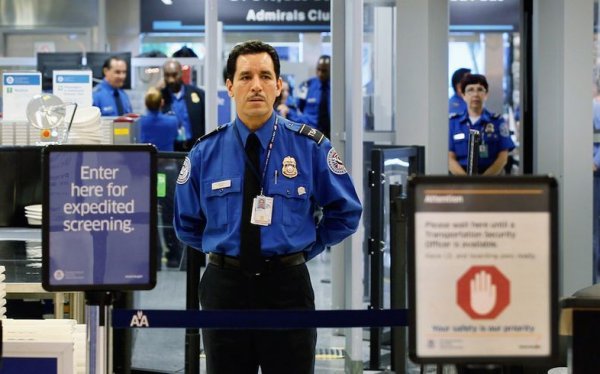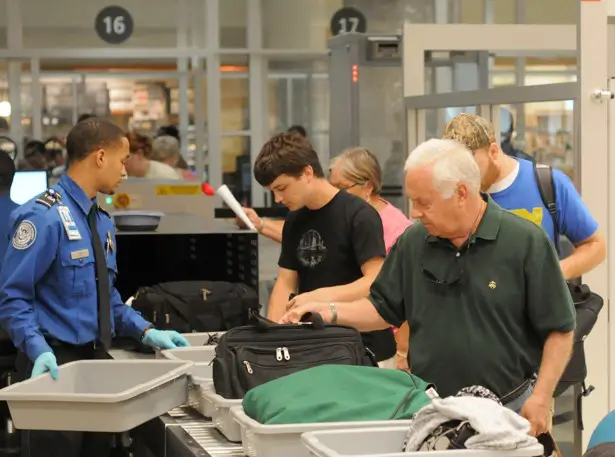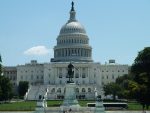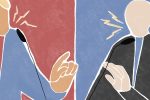The Illusion of Safety
Though Trump claims the news media is his enemy, much of his political platform would be nonexistent without their fearmongering.
By Amna Ijaz, Collins College
Most Americans, liberal or conservative, black or white, feel a sense of fear—a fear of terrorism, as if it’s just around the corner.
Television use has been drastically declining in the last few years, but for some odd reason, whenever a tragedy occurs, audiences find themselves glued to the tube, watching the tragedy unravel. News media sensationalizes these stories to drive up their ratings and keep viewers scared; as long as they are afraid, they are going to watch.
Coverage of this nature leads normally rational citizens to overestimate the dangers of terrorism and how often it occurs. As a result, voters overreact and rally behind leaders who promise useless security measures, all of which is done in the hope of fostering a false sense of security, known as security theater.
Bruce Schneier coined the term “security theater” to refer to public security measures that make people feel more secure without actually improving security at all.

One example of security theater that Schneider provides is that of I.D. checks in buildings. In reality, a security guard going around and checking visitors’ photo I.D.’s is not going to do anything. No one’s face will say, “Pick me please, I’m a real threat.” That doesn’t happen. The measure is put into place purely to create an appearance of security without actually providing any.
Another example of the phenomenon occurred following 9/11, when the National Guard patrolled U.S. airports with unloaded guns. Again, the appearance of security is not the same as actual security.
Nowadays, politicians, such as our sitting president, take advantage of group insecurity by putting forth grossly idiotic measures to enhance the country’s security. To be fair though, those in power have historically manipulated the fears of the public, because to them, approval and appearance matter more than real security.
Real measures that improve the country’s security aren’t as flashy as unloaded guns and massive walls, so they score fewer points with the public. Since methods such as enhancing intelligence-gathering abilities, hiring cultural experts, mending relationships with antagonistic communities and increasing domestic security aren’t as cool, they fail to drive up television and approval ratings, and thus they go unused.
Though it would be easy to lay the blame at the feet of manipulative politicians, they are note solely at fault, as most citizens don’t respond well to the application of pragmatic security measures; they need to see it to believe it.
Security, according to Bruce Schneier, is both a feeling and a reality.
“When people are scared,” he writes, “they need something done that will make them feel safe, even if it doesn’t truly make them safer.”
Most of the time, something on the news is what scares them, but because of how sensationalized the news media can be, deciphering real threats from hyperbolized ones can be nearly impossible.
The more citizens see something on TV, the more they believe it to be true, which leads them to demand unnecessary walls. The public’s ability to gauge risk has been compromised by the traffic-driven rhetoric of the modern media. If you are told again and again that you are in danger of being attacked, whether truly or not, you will eventually begin to believe it.
Again, though experts will tell you to do your own fact-checking, you’re not entirely at fault here. Repeatedly receiving the same message affects what viewers perceive to be their reality, a term psychologists call the availability heuristic. A heuristic is any device used for learning that is imperfect, but suffices to meet immediate goals, examples of which are often “rules of thumb,” educated guesses or stereotypes.
The availability heuristic holds that people make judgments about the probability of events based on how quickly an example of one comes to mind. Thus, though only a handful of domestic acts of terrorism occur a year, they receive non-stop coverage from the news media, and politicians talk about them constantly, rattling off their titles (Sandy Hook, Pulse Nightclub, San Bernadino) again and again until the American public has been so besieged by the idea of terrorism that it seems like a daily occurrence.
In fact, a study published in the Journal of Politics that looked into how terrorism shapes foreign policy after 9/11, found that people who watched more T.V. had a greater chance of believing in an imminent threat of terrorism and were more prone to hawkish responses to it.
The irony is: If it’s on the news, it is, by definition, an uncommon occurrence.
The fact that the news media relentlessly bombards viewers with images and stories of terrorism should actually enforce how rare of an occurrence it is. Statistically, you are more likely to die by getting run over by a lawn mower than at the hands of a terrorist. Still, in 2016, terrorism appeared twice in a list of the top ten fears of Americans.
As a result, millions of frightened voters feel so embattled by the world that they would rather elect a president who takes hyperbolic, theatrical steps to ensure your safety, rather than one who takes unsexy, realistic ones. The heightened fear of terrorism is not a result of increased risk; it’s due to a heightened perception of that risk.
Despite what media rhetoric may have you believe, terrorism is not a big threat to America. That may sound ridiculous considering there was an attack in London just a few days ago, but such offences are still incredibly rare.
Regardless, a country cannot be ruined by a terrorist attack, but it can be crippled by its reaction to one. When Americans start undermining laws and stepping on civil liberties, they are doing the terrorists’ job for them. By refusing to give in to the hate and evil that a psychotic few spread, you can help deny them their biggest weapon—fear.

















